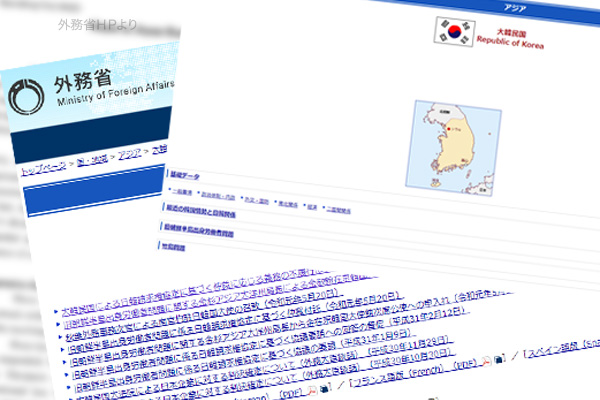There are two events occurring in regard to Japan-South Korea relations. A bilateral director-general level meeting on export control on strategic goods was held in Tokyo on December 16. A bill is being submitted to the National Assembly in Seoul for establishing a foundation to pay consolation money to Koreans who worked for Japanese companies during World War II. Some leaders of the Japan-South Korea Parliamentarians’ Union, a bipartisan lawmakers’ grouping in Japan, have expressed hopes that the bill proposed by Korean National Assembly Speaker Moon Hee Sang might make a breakthrough in bilateral relations.
After observing Japan-South Korea relations over more than 40 years, I conclude that the bill would never lead to resolving the issue. Regarding export control, Japan must hold fast to the principle that the control is about preventing strategic goods from being delivered to terrorists or rogue nations. Therefore, it would be doubly stupid for Japan to make any concession on the export control issue while placing hopes on the Moon bill.
Money could fail to end anti-Japan movements
Any approach using any fund or foundation to distribute money could fail to end anti-Japan movements in South Korea. This has been already proven through the comfort women issue. Regarding wartime Korean workers in Japan, Japanese companies have once paid money on condition that the wartime labor issue not be raised again. However, Japanese and South Korean activists have searched and found new plaintiffs seeking compensations for their wartime labor and relentlessly continued court battles and protest rallies.
In regard to wartime Korean workers, the Japanese government should rebut South Korean arguments based on historical facts and promote international awareness. Since the second Abe administration was inaugurated, the Ministry of Foreign Affairs has launched rebuttal arguments and public relations efforts. The ministry’s website has an icon titled “Issues Regarding History” in the “Topics” section. If we click the icon, we can find a segment titled “Issue known as ‘Wartime Comfort Women’.” In the segment, the ministry writes in English, Korean and Chinese as well as in Japanese that “forceful taking away” of comfort women by the Japanese military and government authorities could not be confirmed in any of the documents, that the expression of “sex slaves” for comfort women contradicts the facts and that the figure “200,000 persons” regarding comfort women lacks concrete evidence.
However, the “Issues Regarding History” do not cover wartime Korean workers in Japan. Starting from the “Countries & Regions” icon on the top page of the website, we can reach a segment on the Republic of Korea and find a page on the “Issue of Former Civilian Workers from the Korean Peninsula.” The ministry there only explains that the issue has been resolved through the San Francisco peace treaty and the agreement on the settlement of claims between Japan and South Korea. However, it fails to argue that Japan’s mobilization of Korean workers was legal then or that there were neither forceful taking away nor slave labor.
Japan must question why Koreans can get compensations after receiving relatively higher wages for working at private companies during the war for two years and supporting Japan’s war efforts. Unless Japan spreads its fact-based rebuttal, anti-Japan movements may linger almost permanently in South Korea.
Don’t betray courageous South Korean intellectuals
In South Korea, courageous scholars and intellectuals have launched movements against anti-Japan sentiment, based on historical facts. A group including Dr. Lee Yong Hoon, one of the authors of “Anti-Japan Tribalism,” a bestseller book in Japan as well as South Korea, carried out rallies demanding the removal of a comfort woman statue in front of the Japanese embassy in Seoul on December 4 and 11. The rallies were held at the same time of and at the location near anti-Japan rallies that were going on in the vicinity of the statue every Wednesday. Lee’s group was attacked by leftist activists on December 11 but vowed to continue protest rallies until the removal of comfort woman and worker statues that distort historical facts and foment anti-Japan sentiment. If the Japanese government or companies make any easy concessions, it may betray these courageous South Korean intellectuals who are physically struggling to spread historical facts.
Tsutomu Nishioka is a senior fellow and a Planning Committee member at the Japan Institute for National Fundamentals and visiting professor at Reitaku University. He covers South and North Koreas.


